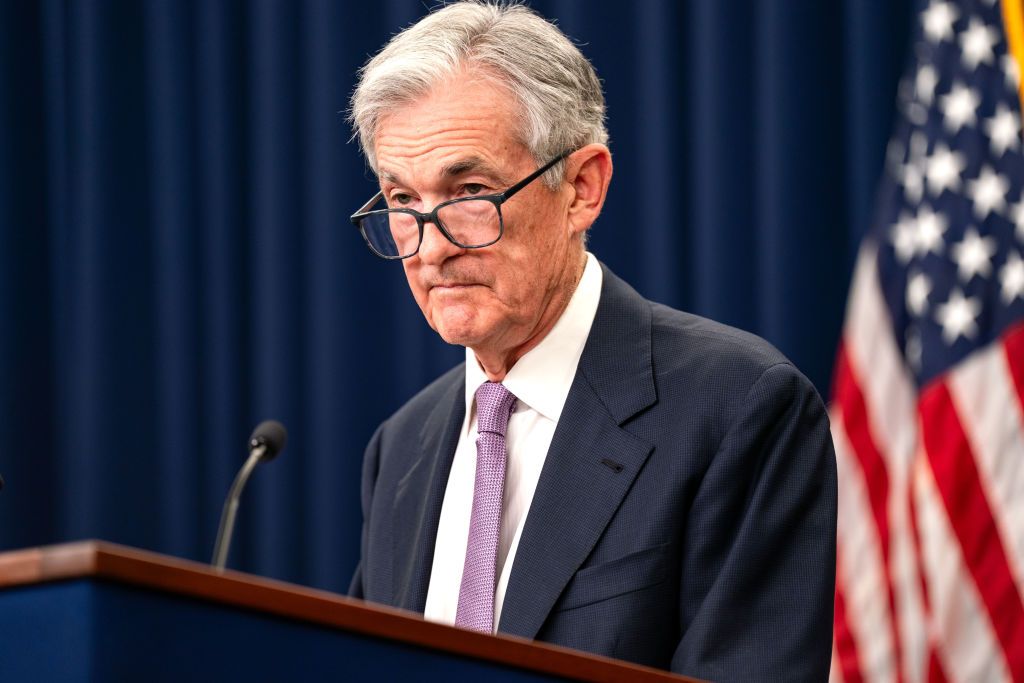
The Federal Reserve Bank of Kansas City's annual Economic Policy Symposium bills itself as a "venue for international central bankers, Federal Reserve officials, other policymakers and academics to discuss issues of mutual concern."
But normies really just care about what Federal Reserve Chair Jerome Powell had to say in his speech Friday morning.
After all, when the Fed chief speaks, markets listen. And that's especially true at this particularly delicate time for both the economy and the independence of the Federal Reserve.
Powell walked a fine line when he delivered what will likely be his final keynote address at Jackson Hole.
The Fed's dual mandate of maximum employment and stable prices is increasingly challenged by a softening labor market and above-target inflation.
In terms of these goals, Powell said in his Jackson Hole speech, that "the labor market remains near maximum employment, and inflation, though still somewhat elevated, has come down a great deal from its post-pandemic highs."
However, Powell added that "the balance of risks appears to be shifting," and this "may warrant" the Fed adjusting its policy stance.
With Powell & Co. increasingly under pressure from the White House to lower interest rates, the Fed chair added that Federal Open Market Committee (FOMC) members will make policy decisions "based solely on their assessment of the data and its implications for the economic outlook and the balance of risks" and "will never deviate from that approach."
Should the Fed cut rates?
In an argument for lower rates, it's true that gross domestic product (GDP) grew at an annual rate of only 1.2% in the first half of the year. Second-half growth is set to come in at a "still-subdued" 1.3%, writes David Payne, staff economist at The Kiplinger Letter, in the Kiplinger GDP Outlook.
A softer labor market also helps make the case for lower rates. The July jobs report featured "stunning revisions that suggest the labor market slowdown has happened earlier than economists expected," Payne notes in the Kiplinger Jobs Outlook.
On the other hand, inflation remains above the Fed's long-term target and tariffs are very much complicating the outlook.
"Inflation has made little progress toward the Fed's 2% target since last year's Jackson Hole conference," writes Lauren Goodwin, economist and chief market strategist at New York Life Investments. "The labor market is better balanced, but increasingly shaped by a mix of cyclical softening, structural trends and policy-driven shocks."
Powell also faces challenges outside the arena of economic data. In addition to the mounting political pressure for the Fed to cut rates, Powell's tenure as chief has even seemingly been put at risk.
More recently, President Donald Trump is threatened to fire Fed Governor Lisa Cook amid allegations over her mortgages.
And inside the Fed, two voting members of the FOMC dissented with the central bank's move to keep rates steady at its July meeting.
Either way, odds are that the central won't stand pat at the next Fed meeting.
Following Powell's Jackson Hold speech on Friday, interest rate traders are now assigning a 91% probability to the FOMC cutting the short-term federal funds rate by a quarter of a percentage point, or 25 basis points, in September.
That's up from 75% one day ago and 58% a month ago, according to CME Group's FedWatch, reflecting changes in the labor market.
What the experts say about Powell's Jackson Hole speech
With the Fed Chair Powell's Jackson Hole speech now in the books, here's some of what economists, strategists and other experts around Wall Street have to say about the results and what they could mean for investors going forward.
"Fed Chair Powell has begun to turn the wheel of the Fed with his speech today, which should benefit consumers and small businesses, along with sectors benefiting from AI, technology, REITs and ttilities. All these sectors benefit from lower financing costs and their dividends will be more attractive with lower bond yields. This is only the beginning of what I hope is a new commitment to several future rate drops." – Ben Fulton, CEO of WEBs Investments
""As expected, Powell's comments remained measured. He acknowledged the difficulty in the Fed's current balancing act and re-re-reiterated their reliance on data-driven decision making. However, he also seemed to conclude that tariffs were more likely to drive a one-time increase in prices, rather than drive a more continuous upward trend in inflation, which would be a change in his stance. He also noted the clear slowdown in the labor market. The implication was that the likelihood of a rate cut in September was even higher than it had been before." – Melissa Brown, Managing Director of Investment Decision Research at SimCorp
"This is just what investors were hoping to hear, given the recent slowdown in the labor market. While there is still one more employment report before the September meeting, it's clear the Fed has enough data under its belt to justify a September cut. The stock market tends to favor lower interest rates and given the likely prospect of a September cut, we expect the market's bullish trend to continue over the short term. We would not be surprised to see a 5-10% correction in the S&P 500 sometime between September and October, in line with historical trends, before rallying to 6,500 through 7,000 by the end of the year." – David Laut, Chief Investment Officer, Abound Financial
""The macro outlook should convince the Fed to cut rates at the September 17th meeting. The hint of upcoming rate cuts will tamp down yields and bolster markets in the near term. But looking out on the horizon, structural shifts in the economy have created uncertainty about the long-run fed funds rate. Suffice it to say, the neutral rate will be higher than during the 2010s." – Jeffrey Roach, Chief Economist for LPL Financial







